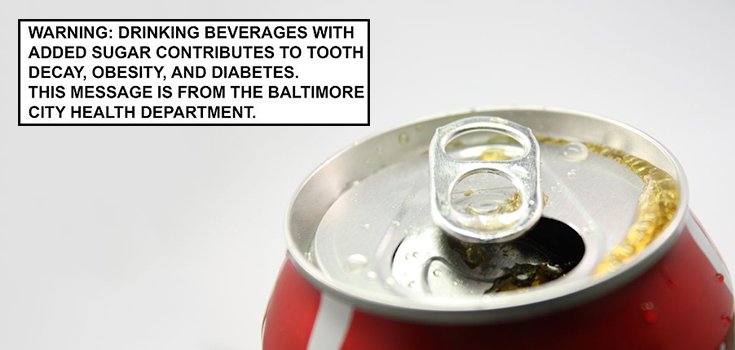Baltimore, Other Big Cities Push for Warning Labels on Sugary Drinks

Next week, the Baltimore City Council will consider a bill that will require warning labels on sugary drinks similar to those found on tobacco products. If the bill passes, it would make Baltimore the first East Coast city to require such a warning.

The council held an official meeting on Tuesday where members discussed the bill, which would require warning labels on not just sugary beverages, but also advertisements, restaurant menus, and at the point of sale where sugary products are sold.
City Health Commissioner Leana Wen, as well as former NFL player and Baltimore native Aaron Maybin, support the proposed measure, in addition to many other city leaders and health officials.
Wen said:
“There is no nutrition whatsoever, they are empty calories and it’s the one thing we can do to prevent our children from having a lifetime of disease and illness.”
Imposing a Soda Tax
Baltimore is following the lead of San Francisco, which will require health warnings on ads for sugary drinks starting in July. In 2014, Berkeley, California, became the only city to impose a 1 cent-per-ounce sugar tax.
And Baltimore is not the only city that wants to crack down on how much sugar its citizens consumer; Philadelphia Mayor Jim Kenney is proposing taxing soda at 3 cents an ounce. He said of the sugar industry:
“They have been selling a product for generation that made them multi-billionaires. We just want a little piece of it back.”
The plan could rake in $400 million for Philadelphia over the course of 5 years. According to Kenney, the funds “would go to expanded quality pre-k for about 8 to 10,000 kids in our city for the next 4 years.”
The American Beverage Association argues the bill will cost jobs and make things financially even harder for low-income families. The group has thus far shelled out $3 million fighting the Philadelphia sugar tax.
Ellen Valentino, executive vice president of the Maryland Beverage Association, told CBS News:
“The beverage companies are taking the lead on educating the public. You have calorie counts at the tip of your fingers, so do we need government mandates, do we need bans and restrictions on popular products? We don’t.”
Sugar Association, Others Against These Measures
The Sugar Association’s President and CEO, Dr. Courtney Gaine testified against the Baltimore legislation, saying the approach could backfire. The doctor claims that sugar is not to blame for the exploding obesity in the United States, but points the finger at grains and fats. She purports that these healthy foods have resulted in a 500-calorie a day increase in American’s diets. Gaine also notes that just 34% of those calories come from added sugars, but ignores the fact that those are empty calories. Grains, on the other hand, provide fiber and protein. She told WMAR:
“This means that 75 percent of children are not drinking soda in Baltimore and at least 25% of overweight kids are not drinking (caloric sweetened beverages). Given that kids get 95% of their calories from other sources, a warning label on CSBs will give the ‘green light’ to all other sources of calories regardless of nutritional value or energy density. This will not help, and could hurt, the obesity problem.”
Meanwhile, studies in recent years have shown just the opposite of Gaine’s claims. A study published in the journal Pediatrics in 2013 found that the more sugary drinks 4- and 5-year-old consumed, the greater their risk was for obesity. Specifically, in 5-year-olds, a daily sugary drink habit was associated with an increased risk of obesity by 1.5 times.
In another study from October 2015, 43 extremely obese kids, ages 9 to 18, were fed a diet free of added sugar for a little over a week. The youngsters lost weight so rapidly that researchers had to increase the number of calories they were feeding them.
Indeed, the warning labels will be very specific to added sugars like high-fructose corn syrup and other sweeteners. Added sugar will be represented in both grams and percent daily value.
Image Sources:
